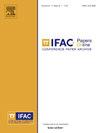Two-wheel-driven Electric Superbike Powertrain Optimization
Q3 Engineering
引用次数: 0
Abstract
In this paper, we propose an optimization framework for the powertrain design of a two-wheel-driven electric superbike, minimizing energy consumption. Specifically, we jointly optimize the force distribution between the wheels with the gear ratio, and rear motor and battery sizing while explicitly considering vehicle dynamics and performance constraints. First, we present an energy consumption model of the vehicle, including a scalable model of the electric machine based on data from the industry, accounting for iron, copper, and mechanical losses. Then, we analyze the propulsive blending strategy to distribute the required power to the wheels while considering adherence limits. Finally, we demonstrate the effectiveness of our approach by analyzing the design of a superbike, based on regulatory driving cycles and a custom high-performance circuit by comparing the force distribution approaches. The results underline the significance of joint optimization of powertrain components and propulsive bias, achieving a reduction of up to 22.36% in energy consumption for the Sport high-performance driving cycle.
两轮驱动电动超级摩托车动力系统优化
本文提出了一种两轮驱动电动超级摩托车的动力系统优化设计框架,以实现能量消耗最小化。具体而言,我们在明确考虑车辆动力学和性能约束的同时,共同优化了车轮与传动比、后电机和电池尺寸之间的力分配。首先,我们提出了车辆的能源消耗模型,包括基于工业数据的电机可扩展模型,考虑铁、铜和机械损耗。然后,在考虑附着限制的情况下,分析了将所需动力分配给车轮的推进混合策略。最后,我们通过分析一辆超级摩托车的设计,基于调节驾驶循环和定制高性能电路,通过比较力分配方法,证明了我们的方法的有效性。研究结果强调了动力总成部件和推进偏置联合优化的重要性,在Sport高性能驾驶循环中实现了高达22.36%的能耗降低。
本文章由计算机程序翻译,如有差异,请以英文原文为准。
求助全文
约1分钟内获得全文
求助全文
来源期刊

IFAC-PapersOnLine
Engineering-Control and Systems Engineering
CiteScore
1.70
自引率
0.00%
发文量
1122
期刊介绍:
All papers from IFAC meetings are published, in partnership with Elsevier, the IFAC Publisher, in theIFAC-PapersOnLine proceedings series hosted at the ScienceDirect web service. This series includes papers previously published in the IFAC website.The main features of the IFAC-PapersOnLine series are: -Online archive including papers from IFAC Symposia, Congresses, Conferences, and most Workshops. -All papers accepted at the meeting are published in PDF format - searchable and citable. -All papers published on the web site can be cited using the IFAC PapersOnLine ISSN and the individual paper DOI (Digital Object Identifier). The site is Open Access in nature - no charge is made to individuals for reading or downloading. Copyright of all papers belongs to IFAC and must be referenced if derivative journal papers are produced from the conference papers. All papers published in IFAC-PapersOnLine have undergone a peer review selection process according to the IFAC rules.
 求助内容:
求助内容: 应助结果提醒方式:
应助结果提醒方式:


